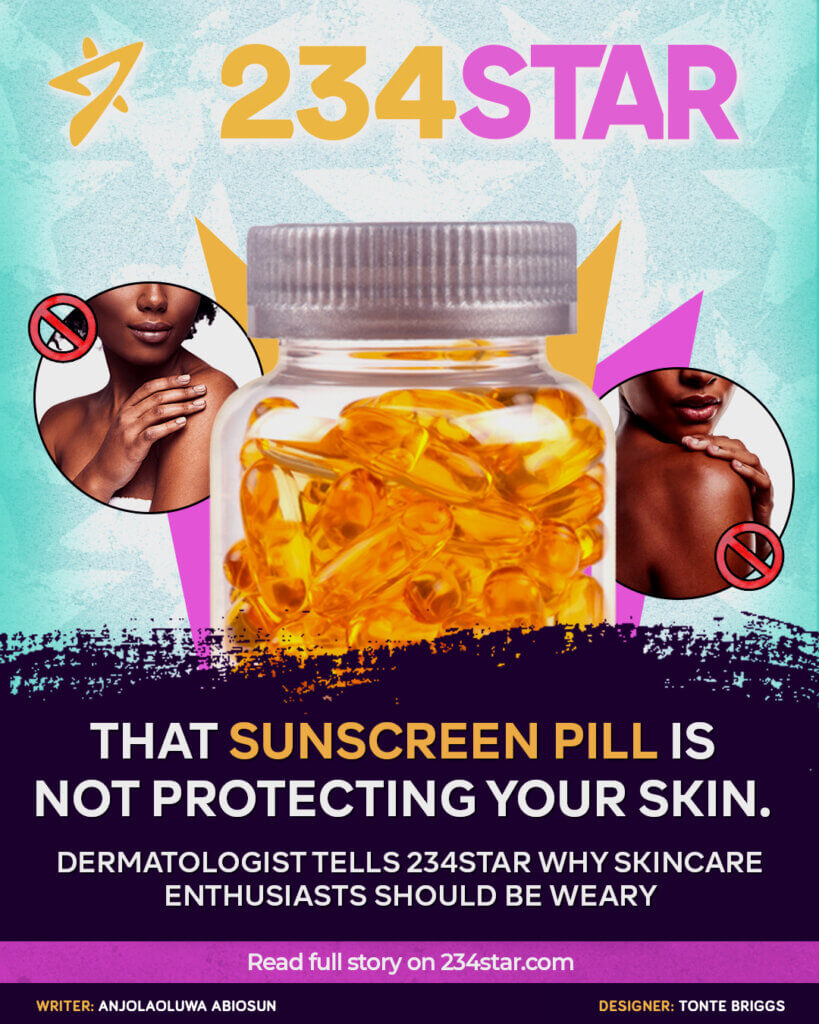Dermatologists worldwide have been battling with an epidemic of organic skincare products that have fed on people’s needs to lighten their skin and ultimately achieve their glassy skin glow with the help of products made from ‘natural ingredients’ or simply products that show faster results. That epidemic is still ongoing, but now we have to deal with sunscreen pill manufacturers.
Contrary to dermatologists’ advice of using sunscreens every three hours between 10 am and 4 pm daily, these sunscreen producers have given the ‘get-goal-skin-quick’ enthusiasts a new way out by taking a pill once a day that helps them avert sunburn and ageing.
Acne reduction, skin protection from sun damage, fighting premature ageing, promoting brighter skin, and reducing dark melanin are some of the many ‘selling points’ of sunscreen pills that dot the online and retail marketplaces.
One of the products that recently became a viral sensation is B’Beau Pwitez Pearl, produced by a Malaysian company Satin Skinz and promoted to Nigerian audience in a now-deleted video by a Nigerian TikTok influencer with over one million followers.
The video was posted to her over a million followers without disclaimers or what the drug was about. All the influencer said was,
‘Don’t forget your sunscreen pills because we are going out the sun today’, she captioned the now-deleted video, in an attempt to spark the curiosity of her followers and lead them to curiosity for the purchase the product.
Since the influencer deleted the video, many have been asking what may have prompted the decision to take down the video promoting the pill while some are of the opinion that she probably didn’t do enough research about the product before promoting it and may have been confronted with facts about the danger posed by suncreen pills.
Skincare influencers, through their social media platforms, are gradually becoming the go-to source for skin care advice as opposed to speaking with dermatologists, largely because many believe it’s more expensive to book a session with a dermatologist. Influencers, through their platform, have found a way to make a living out of their followers’ perception of how knowledgeable they are on the subject they promote on their platforms. In some cases, influencers and notable stars have been found to recommend substandard products that have led to loss of funds by their followers.
On March 11, 2021, a notable pop artiste Rema tweeted a photo of naira notes to endorse an investment company – Brisk Capital Ltd.
His now-deleted tweet, which was reshared over 1000 times and got more than 11,000 likes, led many Nigerians to invest in Brisk, and barely a month later, Brisk crashed and went away with millions of naira invested by its customers
Sunscreen pills are back, and like how they were marketed before, they are considered antioxidant supplements, in the case of Heliocare, and for other products, a substitute for sunscreens, a claim that Dr. Shakirat Gold-Olufadi, a consultant dermatologist vehemently refutes.
“Dermatologists do not support you replacing sunscreen with pills. If you’re taking the pills, you still have to use sunscreen. It does not help in any way,” she told me.
Although these pills have been around for a long time, the United States Food and Drug Administration stated in 2018 that “there’s no pill or capsule that can replace your sunscreen.” These pills are still in production, with manufacturers shipping them across countries, including Nigeria.
As unbelievable as this might sound, there are as many believers in the magic of these drugs and as many sceptics. So for more understanding, Dr. Gold gives a breakdown of how these products work and why they are not approved by dermatologists.
“When it comes to sunscreen pills, it’s been out for some time now, and the major one in the market then was Heliocare, you won’t even find it in the market here, and it contains a leaf extract called Calaguala. It’s a form of supplement, and supplements as the name implies, are supposed to supplement and not completely replace.
“The mechanism of action behind this is that usually UV rays from the sun can cause damage to the skin through the release of free radicals – Free radicals are unstable molecules that are made during normal cell metabolism. We have free radicals, and with exposure to UV rays, these free radicals can be so much, and they can cause damage to the skin.”
Dr. Gold-Olufadi, however, mentioned that although these free radicals can cause skin damage, certain skin types are more susceptible to skin damage than others. According to the dermatologist, caucasians are more susceptible to skin damage than black people. This is because black people have natural protection against the sun, although it’s not 100%.
“The melanin in our skin almost kind of gives us a natural sunscreen that is ten times more protective against the rays of the sun than caucasian skin. That would tell you that our skin already has more protection against free radicals from UV rays, but not 100% protective.
“That is why, rather than skin cancer – because what UV does is that it causes sun-inducing cancers and skin ageing. For black skin, majorly, it is because of skin ageing and sun damage to the skin, that’s why we are really advocating the use of sunscreen. Skin cancer is also there, but instead of being number one, it’s like number three for us.”
So what are the sunscreen pills manufacturers selling? They are basically saying, “you can protect yourself against these free radicals by using pills.” However, there is no scientific data to back up that claim as the protection is not translatable clinically, meaning that it does not replace the use of sunscreen. A piece of information most people are not privy to.
Like normal supplements, these do not offer any protection. Dr. Gold-Olufadi would rather recommend taking food with high antioxidants, fish, olive oil, almond, and using an SPF 50 over sunscreen pills.
With how popular organic and Nigerian skincare products have become over the years, it is also shocking that none of these products can be regulated properly, an issue Dr. Gold-Olufadi calls a difficulty for regulatory bodies like NAFDAC. She cites the example of triple-action creams like Funbact-A and Skineal to make her point clear.
“Triple-action cream contains Neomycin, and most of them contain an antibiotic and antifungal recipe, but if you look at does things, they are not harmful individually. So it is difficult for NAFDAC or FDA to just ban it because they are not harmful. Unfortunately, the combination of three of them has become a problem because some people have turned it into their body creams.
“I can’t count the number of patients I’ve seen and had to manage because of these creams. I’ve managed a child that went into skin failure before, just because they were using these creams for a long time. The steroids in them are a lot, but they are not bad drugs individually, so it’s hard for NAFDAC to do anything.”
The rampancy of these creams exposes societal standards that have led to harmful procedures like skin bleaching, encouraging and building a country with individuals finding ways to make dangerous alterations to their skin – a ready-made customer base for quacks. Not everyone can be light-skinned, and people can’t have acne-free skin all year round, it’s not a possibility, however, it can be managed.
With less than 300 dermatologists in a country of over 200 million people, it has become imperative to understand that just because a person tags their product as an organic skincare product, does not mean they are good for your skin. What are these products made of, what are the implications, based on what capacity are these people allowed to make and recommend these products to you, those are the criteria that should be considered before taking advice from ‘skincare specialists’ on social media.
Social media is here to stay, and people would exploit others to make ends meet. Which is why it is essential to either seek advice from certified dermatologists online or visit one closest to you. Sunscreen pills cannot and do not replace the place of sunscreen creams, especially noting the fact that regulatory bodies have called them a sham.
Even when there are no immediate consequences, over time complications materialise as a result of the use of mercury-containing creams. The organs in the body, like the kidney and liver, responsible for breaking down all these intakes can eventually be affected as a result.





Comments
Loading…